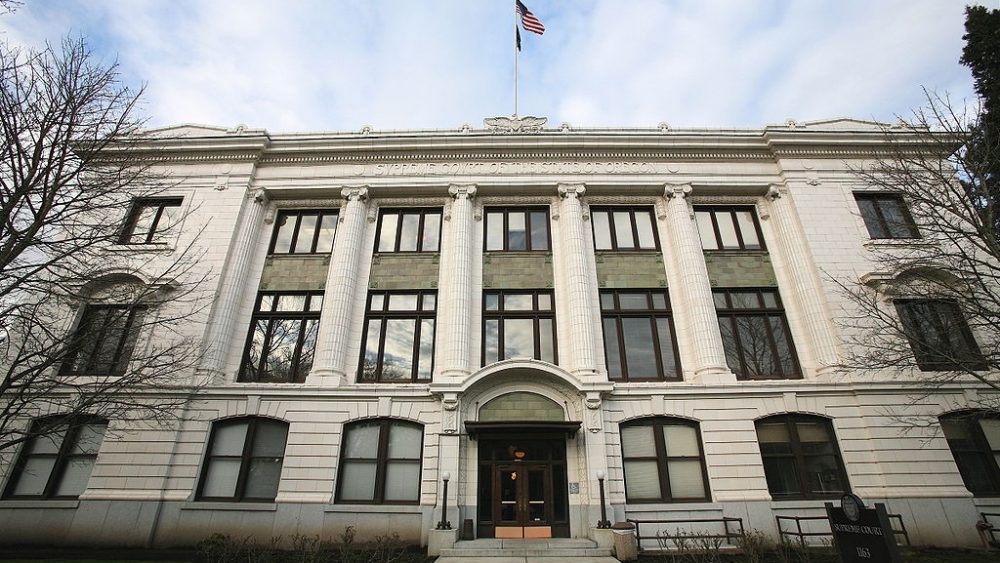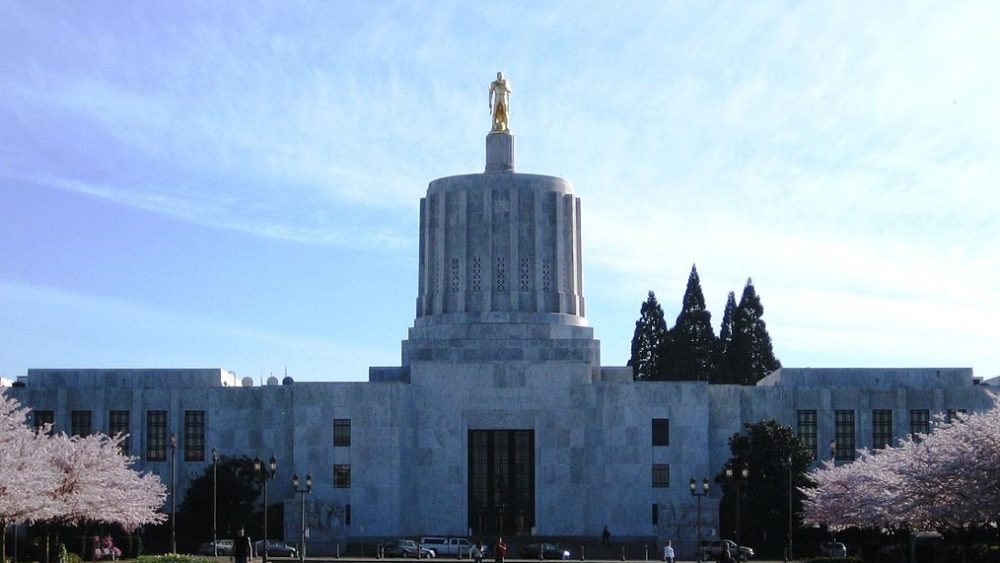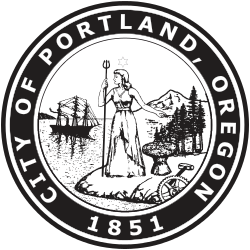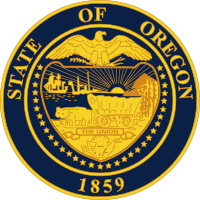January 20, 2022 •
Gov. Kate Brown Appoints New Justices

Oregon Supreme Court - by Cacophony
Gov. Kate Brown has tapped Appeals Court Justice Roger Dehoog to the Oregon Supreme Court. Dehoog is replacing retiring Justice Lynn Nakamoto after six years on the state’s highest court. Brown appointed Judge Ramon Pagan to replace Dehoog and has […]
Gov. Kate Brown has tapped Appeals Court Justice Roger Dehoog to the Oregon Supreme Court.
Dehoog is replacing retiring Justice Lynn Nakamoto after six years on the state’s highest court.
Brown appointed Judge Ramon Pagan to replace Dehoog and has also appointed Kristina Hellman and Anna Joyce to the Court of Appeals, covering retirements.
The appointments take effect immediately, but all appointees will have to run in this year’s election to remain in their positions.
August 10, 2021 •
Justice Lynn Nakamoto to Retire

Oregon Supreme Court - by Cacophony
Gov. Kate Brown announced Monday she is accepting applications to fill a seat on the Oregon Supreme Court. Justice Lynn Nakamoto is set to retire December 31 and the new appointee will fill the vacancy on January 1, 2022.
Gov. Kate Brown announced Monday she is accepting applications to fill a seat on the Oregon Supreme Court.
Justice Lynn Nakamoto is set to retire December 31 and the new appointee will fill the vacancy on January 1, 2022.
January 30, 2020 •
Oregon Democrats Seek to Delay Campaign Contribution Limits Until July 2021

Oregon State Capitol Building
House Democrats introduced a bill putting the 2006 voter approved campaign contribution limits on hold until at least July 2021. House Bill 4124 would give lawmakers more time to pass new campaign contribution limits to replace those approved by voters. […]
House Democrats introduced a bill putting the 2006 voter approved campaign contribution limits on hold until at least July 2021.
House Bill 4124 would give lawmakers more time to pass new campaign contribution limits to replace those approved by voters.
The bill would allow the Legislature to appoint a task force to study campaign finance and make recommendations on how to best establish effective political contribution limits.
Currently, Oregon has no campaign contribution limits because courts have repeatedly struck down or suspended them, including the initiative voters passed almost two decades ago.
The Oregon Supreme Court is expected to rule on Multnomah County’s voter approved campaign finance limits at some point this year.
A ruling in favor of the campaign finance limits would likely revive statewide donation caps as well.
November 21, 2019 •
Oregon Lawmakers Consider Capping Campaign Contributions

Oregon State Capitol Building
At a meeting of the Senate Campaign Finance Committee, Sen. Jeff Golden proposed new regulations that would place ceilings on the amount of money individuals and various types of political committees could give to candidates, campaigns, and one another. Oregon […]
At a meeting of the Senate Campaign Finance Committee, Sen. Jeff Golden proposed new regulations that would place ceilings on the amount of money individuals and various types of political committees could give to candidates, campaigns, and one another.
Oregon is currently one of only a few states that has no campaign contribution limits.
Under this new proposal, individual donors would be limited to giving $2,000 per election for statewide races and $750 per election for House and Senate races.
Those same restrictions would apply to candidates contributing to other campaigns and multi-candidate committees, which would be similar to current special-interest PACs.
State political parties and committees associated with party members in the House or Senate could contribute up to $40,000 per election to statewide candidates and $15,000 per election to legislative candidates.
The same limits would also be applied to new small-donor committees. In exchange for being able to donate larger sums, those committees could only support a single candidate for a single election.
The committees could accept no more than $200 per election from individuals and many PACs.
In November 2020, Oregon voters will decide whether to modify the state’s constitution to explicitly allow campaign finance limits.
The Oregon Supreme Court is also considering whether to overturn a two-decade-old decision that struck down the state’s voter-approved campaign finance limits.
The court is considering the constitutionality of a 2016 ordinance passed by Multnomah County voters that places a $500 per person limit on campaign donations.
Given all that, lawmakers hope to have a framework ready should the legal landscape shift.
December 7, 2018 •
Portland Mayor Enacts Voter Approved Campaign Finance Measure
Mayor Ted Wheeler submitted to City Council a proclamation stating the recently passed campaign finance ballot measure is enacted and in effect. The Honest Elections City of Portland Charter Amendment prohibits corporate contributions and limits contributions from individuals and committees […]
 Mayor Ted Wheeler submitted to City Council a proclamation stating the recently passed campaign finance ballot measure is enacted and in effect.
Mayor Ted Wheeler submitted to City Council a proclamation stating the recently passed campaign finance ballot measure is enacted and in effect.
The Honest Elections City of Portland Charter Amendment prohibits corporate contributions and limits contributions from individuals and committees to $500 per election cycle.
The measure also caps independent expenditures and is likely to face legal challenge.
City Council is expected to submit the measure to the local circuit court for validation early next year.
In 1997, the Oregon Supreme Court struck down statewide campaign finance limits as a violation of free speech protection outlined by the Oregon Constitution.
November 8, 2018 •
Citizens of Portland Vote to Limit Large Political Contributions
Portland, Oregon voters passed a campaign finance measure to limit large political campaign contributions. The amended charter limits independent expenditures to an aggregate of $5,000 per individual and an aggregate of $10,000 per political committee, provided contributions to the committee […]
 Portland, Oregon voters passed a campaign finance measure to limit large political campaign contributions.
Portland, Oregon voters passed a campaign finance measure to limit large political campaign contributions.
The amended charter limits independent expenditures to an aggregate of $5,000 per individual and an aggregate of $10,000 per political committee, provided contributions to the committee by individuals does not exceed $500 per individual per year.
The campaign limits are vulnerable to legal challenge. In 1997, the Oregon Supreme Court struck down statewide campaign finance limits as a violation of free speech protection outlined by the Oregon Constitution.
Prior to the passage of this measure, the City of Portland adopted a public finance system by City Council vote.
It provides matching funds to eligible candidates for mayor, city commissioner, and auditor with funding to begin in the 2019-2020 election.
In Oregon, a Multnomah County Circuit Court judge found county campaign finance reforms unconstitutional. Judge Eric Bloch ruled the voter-approved limitations on campaign contributions and independent expenditures were impermissible under the free speech guarantees within the Oregon Constitution, citing a […]
 In Oregon, a Multnomah County Circuit Court judge found county campaign finance reforms unconstitutional.
In Oregon, a Multnomah County Circuit Court judge found county campaign finance reforms unconstitutional.
Judge Eric Bloch ruled the voter-approved limitations on campaign contributions and independent expenditures were impermissible under the free speech guarantees within the Oregon Constitution, citing a related Oregon Supreme Court opinion.
He ruled they also cannot force disclosure of the largest contributors to political mailers and other forms of communication.
The Multnomah County voters adopted the reforms with an 89 percent “yes” vote in November 2016. An appeal of the judge’s decision is expected.
October 5, 2012 •
Oregon Supreme Court Rules Against Campaign Contribution Limits
2006 ballot measure remains unenforceable
 The Oregon Supreme Court has sided with state officials who refused to enforce a ballot measure limiting campaign contributions and spending. In 2006, voters approved Measure 47, but also rejected Measure 46, a constitutional amendment needed in order to allow the Measure 47 regulations.
The Oregon Supreme Court has sided with state officials who refused to enforce a ballot measure limiting campaign contributions and spending. In 2006, voters approved Measure 47, but also rejected Measure 46, a constitutional amendment needed in order to allow the Measure 47 regulations.
Then-Secretary of State Bill Bradbury did not enforce Measure 47 based on the failure of Measure 46 and a 1997 decision by the high court finding contributions were protected under Oregon’s constitutional guarantee of free expression. Unless voters change the state constitution, or a future court decides differently, Oregon will continue to allow unlimited campaign contributions.
State and Federal Communications, Inc. provides research and consulting services for government relations professionals on lobbying laws, procurement lobbying laws, political contribution laws in the United States and Canada. Learn more by visiting stateandfed.com.

